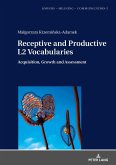Beyond the well-known reading and spelling difficulties, dyslexic individuals exhibit marked phonological disorders, poor lexical retrieval and problems in the comprehension and production of grammatical structures that are particularly expensive in terms of processing costs. To account for these difficulties, the author presents an original hypothesis, proposing that dyslexia is related to a working memory inefficiency, affecting in particular the subject's phonological skills and executive functions. The results of four experimental protocols, assessing dyslexic children's working memory and their ability to interpret scalar implicatures, negative sentences and pronominal expressions, are presented and discussed in this volume. Consistent with the hypothesis outlined in this book, the results of the four studies show that dyslexics underperformed in comparison to age-matched controls and even to younger children in tasks requiring good phonological and processing abilities.
Bitte wählen Sie Ihr Anliegen aus.
Rechnungen
Retourenschein anfordern
Bestellstatus
Storno








